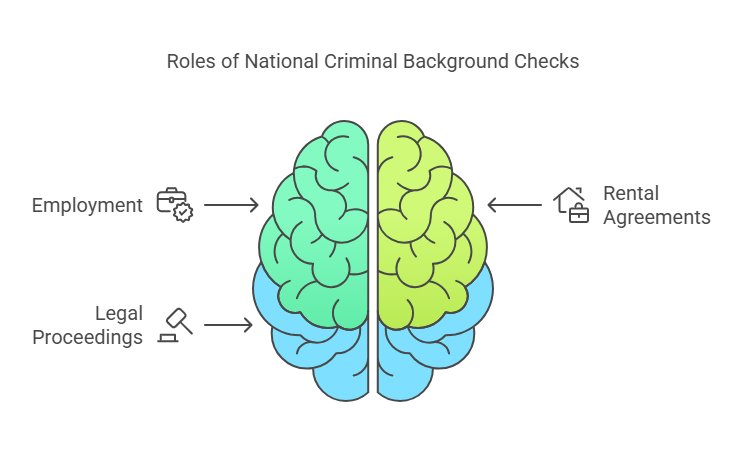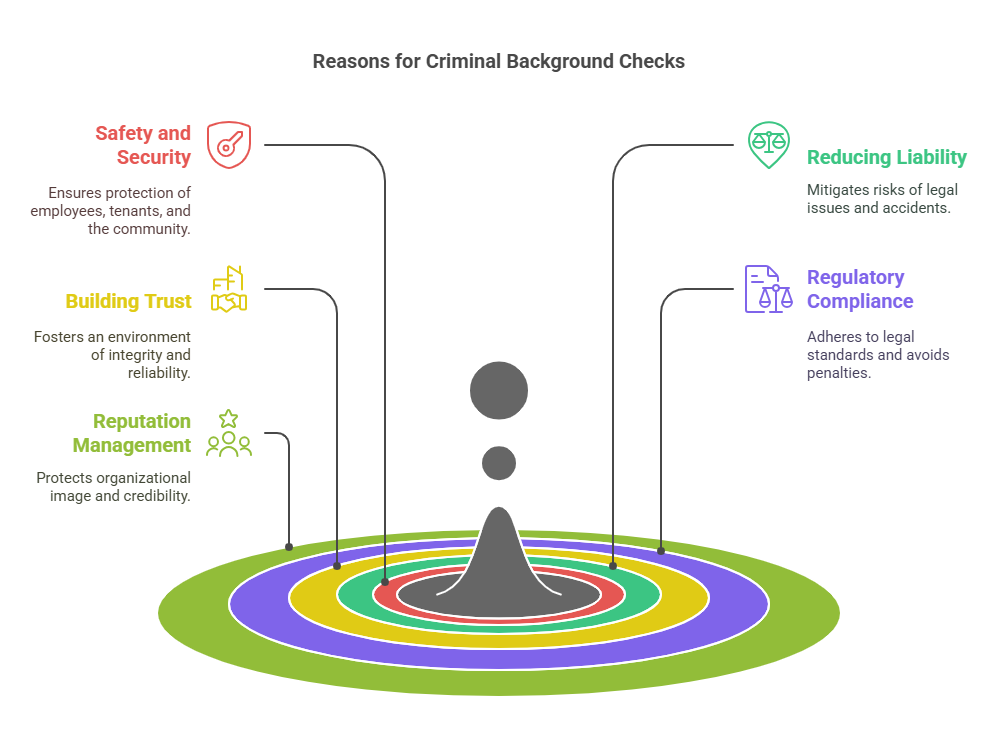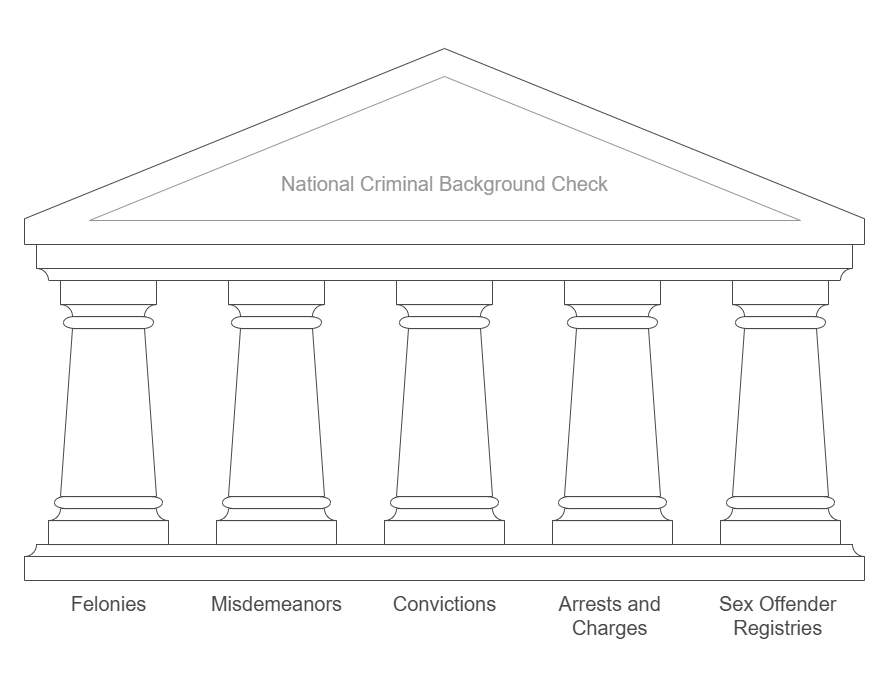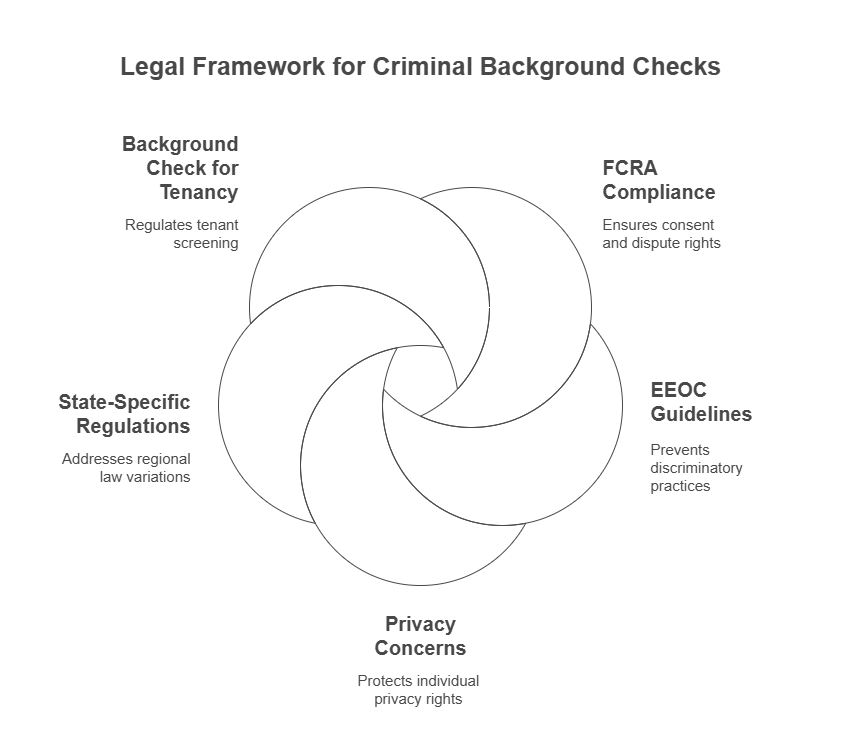Steps to a Successful National Criminal Background Check

What is a National Criminal Background Check?
A National Criminal Background Check (NCBC) is a process used to investigate an individual’s criminal history on a national scale, examining records across multiple jurisdictions to provide a comprehensive view of past criminal activity. Unlike local or state-level checks, which focus on a specific region, a national criminal background check compiles information from multiple states and federal sources, providing a broad perspective on an individual’s criminal history.
These checks are typically conducted by organizations to assess a person’s criminal background, offering crucial insights into their eligibility for specific roles or responsibilities. National criminal background checks can reveal felonies, misdemeanors, and convictions, along with any relevant court records, sex offender status, and other criminal activities that may impact the individual’s suitability for employment, housing, or legal proceedings.
Importance of National Criminal Background Checks

National criminal background checks are critical for ensuring public safety, security, and fairness. These checks help various organizations, including employers, landlords, government agencies, and legal authorities, assess the risk posed by an individual. By reviewing an applicant’s criminal history on a national level, decision-makers can identify potential risks, verify an applicant’s history, and make informed decisions that contribute to a safer and more trustworthy environment.
- Employment: Employers use national criminal background checks to evaluate job applicants, ensuring that they are hiring trustworthy individuals. For sensitive positions, such as those in healthcare, education, or finance, it is especially crucial to confirm that the candidate does not have any serious criminal convictions that could jeopardize the organization’s integrity or the safety of clients and customers.
- Rental Agreements: Landlords use national criminal background checks to evaluate the criminal history of potential tenants, ensuring that they are not renting to individuals with a history of violent crimes, theft, or other serious offenses. This step is essential for maintaining the safety of the property, other tenants, and the surrounding community.
- Legal Proceedings: In legal contexts, national criminal background checks are used to assess an individual’s criminal record for purposes such as probation, parole, or court hearings. Courts may request these checks to help determine an individual’s background and the potential risk they pose to the community.
National Criminal Background Check vs. Local and State-Level Checks
While a national criminal background check provides a broad, comprehensive view of an individual’s criminal history across multiple states and federal records, local and state-level background checks are confined to specific jurisdictions. Here’s a breakdown of the differences:
- Local Criminal Background Check: Conducted by local law enforcement or municipal agencies, this check only covers criminal records within a specific city or county. It may miss crimes committed outside of the local jurisdiction.
- State-Level Criminal Background Check: Performed by state agencies, such as the state police or bureau of criminal investigations, this check examines records within a particular state. It can uncover criminal offenses committed within the state’s borders but does not provide insight into crimes in other states or federal jurisdictions.
- National Criminal Background Check: A national check aggregates data from all states, federal records, and databases, providing a comprehensive report on an individual’s criminal history from a nationwide perspective. This is crucial for situations where a broader search is needed, such as for job applicants relocating from another state or those who may have a history of moving between jurisdictions.
The key difference is the coverage area—a national criminal background check offers a more extensive search compared to local or state-level checks, offering a wider scope for employers, landlords, and other organizations making high-stakes decisions.
Why Employers, Landlords, and Organizations Rely on National Criminal Background Checks

Employers, landlords, and other organizations rely on national criminal background checks for several reasons:
- Safety and Security: One of the primary reasons these checks are performed is to protect the safety and security of employees, tenants, clients, and the community at large. By identifying potential risks, organizations can prevent individuals with violent or serious criminal backgrounds from being in positions of trust or responsibility.
- Reducing Liability: Employers and landlords are responsible for the well-being of their employees, tenants, and customers. By conducting thorough background checks, they can mitigate the risk of hiring or renting to individuals with a history of criminal behavior that could lead to accidents, harm, or legal issues.
- Building Trust: By conducting a national criminal background check, employers and landlords can ensure they are hiring or renting to trustworthy individuals. This fosters an environment of trust and integrity, essential for any organization or community.
- Regulatory Compliance: In many cases, legal regulations and industry standards require that employers, landlords, and other organizations perform criminal background checks. Compliance with these laws helps avoid legal issues and penalties.
- Reputation Management: Organizations that take proactive steps to ensure they are hiring individuals or renting properties to responsible tenants can protect their reputation. This is particularly important in sectors like healthcare, finance, and education, where trust and safety are paramount.
How a National Criminal Background Check Works
A National Criminal Background Check (NCBC) involves collecting and reviewing criminal history records from multiple jurisdictions across the United States. The process is typically conducted by third-party agencies or official entities to ensure a thorough search of national criminal databases and legal records. Here’s an overview of the step-by-step process:
- Authorization: Before initiating a national criminal background check, the individual in question must provide written consent for the check to be conducted. This is a critical first step, as employers, landlords, or agencies must comply with Fair Credit Reporting Act (FCRA) guidelines that protect an individual’s rights during the screening process.
- Information Gathering: The check typically requires identifying information such as:
- Full name
- Date of birth
- Social Security number
- Address history
- Any known aliases This information helps the screening agency accurately identify the individual and match them with criminal records across the nation.
- Accessing Criminal Databases: The agency conducting the background check searches through national databases, including:
- FBI Criminal Database: Contains federal criminal records.
- State Criminal Records: Covers state-level records, including arrests, convictions, and other criminal activities.
- County Criminal Records: Accesses local court records from specific counties.
- National Sex Offender Registry: Provides information on individuals convicted of sexual offenses.
- Most Wanted Lists: Includes individuals wanted for serious criminal offenses.
These databases are essential for providing a comprehensive criminal history check. The more databases the search accesses, the more comprehensive the results will be.
- Report Generation: After the data is collected, a detailed report is compiled. This report will include information on:
- Felonies and misdemeanors (both past and current)
- Convictions, sentences, or pending cases
- Arrest records and charges
- Any active warrants or protective orders
- Probation or parole status
- Criminal charges that were dismissed, if applicable
The report is then delivered to the requesting entity (employer, landlord, etc.), providing them with an overview of the individual’s criminal history.
- Review and Action: The requesting entity reviews the criminal history report. Depending on the findings, the entity may make decisions regarding employment, housing, or other legal matters. If no criminal records are found, the individual may move forward in the process. However, if disqualifying criminal history is discovered, further evaluation may be needed before a final decision is made.
Types of Criminal Records Included in a National Criminal Background Check

A comprehensive national criminal background check can reveal several types of criminal records. Below are the most common elements included in the check:
- Felonies: Felonies are the most serious crimes and may include offenses like homicide, sexual assault, theft, or drug trafficking. These are usually punishable by over a year in prison and often result in significant legal consequences, including a permanent criminal record.
- Misdemeanors: Misdemeanors are less serious than felonies and typically involve crimes such as petty theft, simple assault, vandalism, or drunken driving. Although punishable by fines or shorter prison sentences (usually less than a year), misdemeanors can still disqualify an individual from certain opportunities, particularly in sensitive fields.
- Convictions: National background checks highlight any criminal convictions an individual has received. Convictions are final decisions made by courts based on proven criminal activity, and they usually result in a criminal record. These convictions are recorded at the federal, state, and local levels.
- Arrests and Charges: Arrests or charges may also be included in a criminal background check. While an arrest does not necessarily equate to guilt or a conviction, it can still raise concerns for employers or landlords. Some organizations choose to evaluate charges or arrests as part of their decision-making process.
- Sex Offender Registries: The national check often includes a search of the National Sex Offender Registry to identify individuals who have been convicted of sexual offenses. Being listed in this registry is a critical red flag for many employers and landlords, especially in professions or housing situations where safety is a priority.
- Pending Criminal Cases: In some cases, a national background check can identify pending criminal cases—charges that have not yet been resolved in court. While these cases may not show a final conviction, they could still signal potential issues and raise concerns for organizations.
- Warrants: A national check may also reveal active warrants for an individual’s arrest. A warrant indicates that law enforcement believes the individual has committed a crime and is seeking their arrest.
Benefits of a National Criminal Background Check
National criminal background checks provide a comprehensive overview of an individual’s criminal history, helping organizations make informed decisions regarding safety and eligibility. Here are some of the primary benefits:
- Ensures Comprehensive Screening: One of the most significant advantages of a national criminal background check is its comprehensive nature. By accessing multiple databases across federal, state, and local levels, it provides a holistic view of an individual’s criminal history—something local or state checks may miss.
- Protects Employers, Landlords, and Clients: By identifying individuals with serious criminal histories, national background checks help employers and landlords make decisions that ensure the safety of employees, tenants, and other clients. For sensitive positions such as childcare, healthcare, finance, and law enforcement, ensuring candidates are free of criminal records is essential.
- Fulfills Legal and Regulatory Requirements: Some industries are required by law to perform national criminal background checks as part of their screening process. For example, healthcare providers, schools, and financial institutions often need to adhere to strict guidelines to ensure that they are hiring trustworthy and reliable individuals.
- Mitigates Risk: For businesses and property managers, a national background check helps mitigate the risk of lawsuits, theft, or violence by ensuring that individuals with a violent or criminal history are not hired or granted tenancy. This reduces liability and maintains a safer environment for all parties.
- Increases Trust: Conducting a thorough background check promotes trust with employees, tenants, and the public. By confirming that candidates have been properly screened, organizations demonstrate their commitment to security and integrity.
- Helps with Legal Compliance: National criminal background checks are essential for FCRA compliance and other legal guidelines. Employers and landlords are legally obligated to ensure that they are not discriminating based on criminal records in a way that violates federal or state regulations.
Who Requests National Criminal Background Checks and Why?
Many different entities request national criminal background checks for a variety of reasons:
- Employers: Employers request national criminal background checks as part of the hiring process to assess a candidate’s criminal history and potential risks. These checks are critical for positions involving childcare, healthcare, finance, transportation, and security.
- Landlords: Property managers and landlords use national criminal background checks to ensure tenants do not have serious criminal convictions that could pose a risk to the safety of the property and the community.
- Government Agencies: Various government agencies may request a national criminal background check to ensure individuals are eligible for government programs, services, or employment.
- Legal Entities: Courts and law enforcement agencies may use national background checks in cases involving probation, parole, or pre-trial assessments. They help determine the individual’s history and the risk they may pose.
- Voluntary and Non-Profit Organizations: Many non-profit organizations, especially those that work with vulnerable populations (e.g., children, the elderly, or victims of abuse), request national criminal background checks to ensure volunteers or staff members are safe to work with these groups.
Legal Aspects of National Criminal Background Checks

National criminal background checks are subject to various legal frameworks that govern their use, ensuring that the process is conducted fairly, transparently, and with respect for individual privacy. Below are some of the key legal considerations:
- Fair Credit Reporting Act (FCRA) Compliance: The Fair Credit Reporting Act (FCRA) is a federal law that governs how background checks are conducted, including criminal background checks. It requires that employers, landlords, and other entities obtain written consent from an individual before performing a national criminal background check. This ensures that the person is aware of and agrees to the screening.Additionally, the FCRA stipulates that if the results of the background check are used to make an adverse decision (e.g., not hiring an applicant or denying housing), the individual must be provided with a pre-adverse action notice and the opportunity to dispute any inaccuracies before a final decision is made.
- Equal Employment Opportunity Commission (EEOC) Guidelines: The Equal Employment Opportunity Commission (EEOC) provides guidelines to ensure that criminal background checks do not lead to discriminatory hiring practices. For example, employers cannot automatically reject candidates based on a criminal record alone. They must evaluate whether the conviction is relevant to the job and consider factors such as the nature of the crime, how much time has passed, and the applicant’s rehabilitation efforts.These guidelines aim to prevent discrimination based on race, national origin, or other protected characteristics that could be disproportionately affected by criminal history.
- Privacy Concerns: Criminal background checks must balance the need for safety with respect for individual privacy. Some records, such as juvenile offenses, are often excluded from background checks to protect the rights of minors. In some jurisdictions, there are also restrictions on how long ago a criminal conviction can be reported—particularly for minor offenses or those that occurred many years ago.Additionally, only authorized parties, such as employers or landlords, are allowed to request and access these reports. Unauthorized access or sharing of criminal background information may lead to legal consequences under privacy laws.
- State-Specific Regulations: The rules governing background checks can vary by state. Some states have “ban the box” laws, which prevent employers from asking about an applicant’s criminal history until after an initial interview or job offer. These laws aim to give individuals with criminal backgrounds a fairer chance at employment.Additionally, some states limit the use of certain types of criminal records in background checks. For example, certain convictions may be sealed, expunged, or excluded from the background check report after a specific period.
- Background Check for Tenancy: When it comes to national criminal background checks for tenancy, landlords must also comply with state and federal laws regarding tenant rights and Fair Housing Act regulations. They are prohibited from discriminating against potential tenants based on criminal history unless the individual’s criminal background poses a direct threat to the health or safety of others.
FAQs About National Criminal Background Checks
Here are answers to some common questions regarding national criminal background checks:
What is the key difference between a National Criminal Background Check and a State or Local Criminal Background Check?
- A National Criminal Background Check gathers information from multiple states, federal records, and national databases, providing a comprehensive view of an individual's criminal history across the entire country. State and local checks, on the other hand, are limited to records within a specific state, county, or city, potentially missing criminal activity that occurred in other jurisdictions.
Why do employers and landlords rely on National Criminal Background Checks?
- Employers and landlords rely on national checks to ensure safety and security, reduce liability, build trust, comply with regulations, and manage their reputation. These checks help them identify potential risks by revealing criminal histories that might not surface in local or state-level checks, particularly when dealing with individuals who have moved between states.
What types of criminal records are included in a National Criminal Background Check?
- A national check can reveal felonies, misdemeanors, convictions, arrests, charges, sex offender registry listings, pending criminal cases, and active warrants. It provides a broad overview of an individual's criminal history, including both serious and less severe offenses.
What legal considerations must be followed when conducting a National Criminal Background Check?
- Legal considerations include compliance with the Fair Credit Reporting Act (FCRA), which requires written consent and provides individuals with the right to dispute inaccuracies. Employers must also adhere to Equal Employment Opportunity Commission (EEOC) guidelines to prevent discriminatory practices. Additionally, state-specific regulations and privacy concerns must be addressed.
How does the process of a National Criminal Background Check work?
- The process involves obtaining written authorization, gathering personal information, accessing national criminal databases, generating a detailed report, and reviewing the report to make informed decisions. The report includes information on felonies, misdemeanors, convictions, arrests, and other relevant criminal records.
Conclusion
A national criminal background check is an essential tool for ensuring the safety, security, and trustworthiness of individuals across various industries and sectors. Whether for employment, tenancy, or legal proceedings, these checks provide a comprehensive overview of an individual’s criminal history, which helps decision-makers assess potential risks.
While the process can vary depending on the requestor and the databases accessed, the benefits of conducting national criminal background checks far outweigh the potential risks of neglecting them. Employers, landlords, and other organizations that conduct these checks help maintain a safer environment for their employees, tenants, and clients.
It’s crucial to understand the legal aspects, privacy concerns, and rights associated with criminal background checks. By ensuring compliance with FCRA, EEOC guidelines, and state-specific regulations, organizations can conduct background checks legally and ethically while safeguarding the rights of individuals.
For both employers and individuals, working with a trusted background screening service, like Exact Background Checks, can help streamline the process and ensure the checks are conducted with accuracy, efficiency, and in compliance with relevant laws.




Great breakdown! Following the right steps to a successful national criminal background check ensures accuracy and compliance. Thorough screening helps employers make informed hiring decisions while maintaining safety. Thanks for sharing these key insights!
This is an excellent overview of national criminal background checks! It highlights their importance for safety, compliance, and informed decision-making. The legal insights, like FCRA and EEOC guidelines, are particularly valuable for ensuring ethical practices. A must-read for employers and organizations prioritizing thorough and fair screening processes.